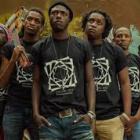Sarabi
Bio
The Eastlands Ghettos of Nairobi Kenya famously known for Crime and drugs is also home to Sarabi, undoubtedly the best East African Live performance outfit. The seven young Men and a lady despite their young ages have over the years beaten all odds to cement a position amongst Africa’s greatest bands.
Sarabi’s story begins in the tin and cotton houses, dark and dusty allies of Eastlands Ghettos. In these streets, dreams are shuttered and very few youngsters survive to celebrate their 18th Birthday. With the absence of music and arts education in schools, Sarabi’s musical Safari would never have started without the Haba na Haba art Center now Vocal, founded by Sarabi’s Manager George “Ndetcheh” Ndiritu in 1998.
The center provided free practical performing arts classes for Children and youth and also provided leadership training. Kids who had an interest in Music where selected to join the Projects Music program and formed into different bands. At the age of 11 – 14 years, Sarabi then named Sauti za Kwetu was amongst the groups formed.
At the beginning, Sarabi’s Music was wholesomely a blend of different traditional Kenyan sounds coupled with A cappella and traditional Kenyan dances. This set a foundation for Sarabi’s music today. Their instruments set-up was simple, five Kalapapla drums, two Mbumbumbu bass drums, two acoustic guitars and congas.
The lyrical content during the formative years was partly Love and a bit of Protest. This was inspired by their community’s struggle and musical influences of Bob and The Wailers, Eric Wainaina, Lucky Dube and Alpha Blondy.
A year after formation, the group was invited to participate at the 2006 World Urban Forum in Vancouver Canada where they shared a stage with the Moipei Quartet, GidiGidi MajiMaji and Tumi and the Volume. As part of the tour, the band published a book, Image-In the MDGs. The publication provided a compelling structuring element for discussing development strategies and policies and understanding the global dimension within which their voices can be heard and their messages addressing the United Nation’s pledge to address global poverty.
Sarabi has taken the imagination of Africa and is referred as a reincarnation of Bob Marley with the live performance etiquette of Fela Kuti. Just like the two, SARABI journey is a story of hope and the struggle for equal rights and Justice for all.
Off the Stage Sarabi continues to champion the struggle for Justice. In 2015, Sarabi is engaging in a country wide project dubbed Jukumu Letu (My Responsibility) to increase interest and understanding of the Kenyan constitution amongst the youth through the use of Music.
The band will also be engaged in a climate change project supported by the Alliance Francaise and Goethe Institute that aims to change and remove the Climate change Conversations from Conferences and workshops to the streets. The Band is also ambassadors of the “Hands off our Elephants!" campaign.


























































